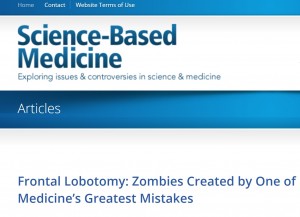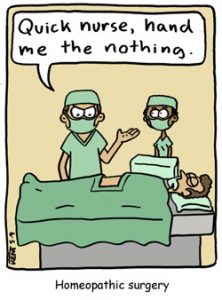 David Katz is a prominent proponent of integrative medicine. We in the science-based medicine (SBM) community have on several occasions over the last seven years critically addressed some of his claims, for the purpose of public intellectual discourse on topics of vital interest to the public, namely health care. When Katz has responded, he has typically done so by attacking a strawman rather than the actual SBM position.
David Katz is a prominent proponent of integrative medicine. We in the science-based medicine (SBM) community have on several occasions over the last seven years critically addressed some of his claims, for the purpose of public intellectual discourse on topics of vital interest to the public, namely health care. When Katz has responded, he has typically done so by attacking a strawman rather than the actual SBM position.
He has now done so again, in a transparent fashion. I suspect he is responding to our criticism of him from a couple of week ago. He has now written an article in the HuffPo in which he makes specific claims about SBM that are demonstrably false. When criticizing some one or group who advocates a position with which you disagree, it is critical to be fair, even charitable, to their position. At the very least you should endeavor to properly understand the position you are criticizing. Failing to do so falls somewhere on the spectrum from intellectually dishonest to lazy. Usually the pre-existing narrative holds sway and runs roughshod over the evidence, even when in plain sight.
Katz in his recent article is responding to an article in JAMA that reviews 10 standard practices the authors believe are not supported by evidence and should be questioned. This is exactly the kind of process that we support at SBM – examining all practices from a science-based point of view. The first half of Katz’s article is also quite reasonable, and in fact is something that could easily be found on the pages of SBM.
He did not stop there, however, and used the opportunity to go on a tear against SBM and in defense of his beloved Integrative Medicine. Here is where he goes south:
At the same time, and equally important, a certain sanctimony about evidence-based medicine results in contemptuous disregard for the “unconventional.” This broad designation may, at times, refer to so-called “alternative” medicine, where detractors will suggest one is headed toward voodoo. But it also refers to lifestyle interventions that are very far from the worrisome realm of “woo.”
Katz repeats the common CAM (complementary and alternative medicine) fiction that lifestyle factors are unconventional. This is nonsense, easily debunked by simply looking at historical evidence. Scientific conventional medicine identified the relationship between specific lifestyle factors and disease risk. Lifestyle recommendations have been slowly phased into convention medicine as the evidence has come to light. Sure, this has happened slower than we would have liked – in general the medical profession is slow to adapt to the evidence. They come around eventually, but we do need to explore ways to make this process happen more quickly. In any case, CAM does not own lifestyle factors. They have simply appropriated them to have some legitimate footing to their entire endeavor.
The rest of his statement needs to be put into the context of what he also says in the article:
If evidence matters, it matters equitably, and universally.
This has been a persistent theme of David Katz – accusing critics of CAM of having a double standard. The opposite is the truth. SBM specifically calls for one universal science-based standard of care. That is our very publicly and frequently stated position.
It is the proponents of CAM who are explicitly calling for a double standard. Health care freedom laws are about creating a double standard for CAM therapies. The National Center for Complementary and Integrative Health is about creating a double standard for CAM research funding. Dr. Katz himself has called for “a more fluid concept of evidence” when considering CAM.
The fact is, when held to the light of science, CAM therapies do not hold up well. That is precisely why they are alternative. Proponents don’t acknowledge this, so they have to create the fiction that CAM therapies are being treated unfairly. Katz repeats that accusation here:
In other words, the prevailing pattern is that “we” (i.e., conventional medicine) are innocent until proven guilty, but everyone else is guilty until proven innocent. No special olfactory acuity is required to discern how bad that smells.
What Katz is referring to here is not a double standard but simply considering scientific plausibility or prior probability. Katz has directly criticized the use of scientific plausibility in evaluating medical treatments. He is wrong, but at least here he is discussing the actual issue at hand.
It is true that conventional medicine will often use a treatment because it seems plausible before there is adequate evidence to show that it actually works. That, more than anything, is the central criticism put forth by the evidence-based medicine movement. EBM specifically eliminates considerations of plausibility in order to avoid this error.
SBM recognizes the problem but does not take that approach. Rather, we argue that treatments should be based on both scientific plausibility and rigorous clinical evidence. At the very least the clinical evidence needs to be put into the context of scientific plausibility.
Another way to look at the difference between SBM and EBM is that EBM tends to follow more of a frequentist statistical approach (with its over-reliance on p-values) while we prefer more of a Bayesian approach. The latter begins with prior probability and then evaluates the effect that any new clinical evidence has on that probability. In this way SBM advocates looking at all the scientific evidence to come to one overall conclusion about the likelihood that a treatment has benefits in excess of risks.
We advocate applying this standard to all of medicine.
I honestly don’t mind that Katz disagrees with us and advocates a different approach. Let’s have it out in open discussion. That is how better ideas prevail. I do mind when he mischaracterizes what SBM does and stands for. This is what he does here:
To the best of my knowledge, a rather boisterous group in cyberspace calling itself “science based medicine” is silent on all of this. They preferentially malign all alternatives to conventional medicine, implying that problems of evidence and its application lie entirely without, and not within. This, in turn, makes it clear that such protest is itself unconcerned with the underlying evidence, and born instead of ideological zealotry. If evidence matters, it matters equitably, and universally.
The link on SBM is not to SBM but to the recent article he wrote essentially calling us fools and fanatics (to which David Gorski and I responded two weeks ago).
Prefacing his claim with “to the best of my knowledge” does not save Katz from criticism for making a blatantly untrue statement. He is saying that SBM is silent when it comes to criticism of mainstream medicine. I am not saying that Katz should be highly familiar with the thousands of articles we have published on SBM. But even a casual perusal shows this claim to be false.
He could have also plugged something like “cancer screening” into the search window on SBM. He would have been greeted with 190 articles, most of which are discussing mainstream cancer screening practice. This was one of the actual topics of the JAMA article, and ironically David Gorski has addressed the very issue on SBM.
Just for fun I looked at the most recent 60 articles on SBM. Forty of them dealt with CAM, pseudoscience, science denial, a fringe treatment, or the regulation of fringe treatments or professions. That is undoubtedly our expertise and focus at SBM. However, 10 articles dealt with criticism of mainstream practice, 3 dealt with the nature of medical evidence itself, and 6 were about other topics. That is 10 articles in the last couple of months that Katz says “to the best of my knowledge” don’t exist. Often “to the best of my knowledge” means “I never bothered to look.”
In addition to being demonstrably factually wrong, Katz draws the wrong conclusion from his confirmation bias. He thinks it is “clear” that our focus on alternative treatments is due to “ideological zealotry.” This is a common tactic of CAM proponents – they try to depict the defenders of a reasonable standard of evidence as the zealots, while those trying to sell treatments based on magic and pseudoscience are just being “open-minded.”
We are actually quite open about our editorial policy. We focus on pseudoscience, unconventional treatments, and fringe claims for very good reasons.
1 – In establishing what the standard of science and evidence in medicine should be, it is useful to shine the light on the most egregious violators.
2 – The mainstream media does a generally poor job of reporting on fringe topics, falling for false balance, citing outliers as experts, and hyping sensational claims. We are filling a gap and correcting a great deal of bad science reporting.
3 – Understanding pseudscience is a specialty unto itself that requires specified knowledge. This knowledge is generally lacking in mainstream science and academia. That is our specialty, so of course we focus on it.
4 – Mainstream medicine already has an infrastructure of experts examining and commenting on practice and evidence. Our efforts there would largely be redundant. When we feel they aren’t, we comment.
The core of SBM, however, is an examination of the nature of scientific and clinical evidence, and the relationship between that evidence and the practice of medicine. We feel we have a very solid position, and Katz has failed to criticize it in any meaningful way. Instead he and others attack predictable and rather tired straw men.
In fact Katz’s entire article is just another iteration of the tu quoque logical fallacy common in CAM circles – trying to avoid criticism of CAM practice by saying that mainstream medicine has problems of its own.
In fact this is where Katz gets it most wrong – in his musings about how to fix the shortcomings of mainstream medical practice. He writes:
The cleanup will certainly not come courtesy of those calling themselves “science-based,” who live within its glass walls, tossing stones outward. They produce nothing more useful than shards of glass.
It will come courtesy of those who concede, with suitable humility, that no single domain of influence has a monopoly on dirty boots. It will come courtesy of those who like a level playing field, and respect the potential for baby and bathwater in any given tub.
This is a massive exercise in rewriting history and missing the point. SBM is, in fact, the solution to the problems he discusses. SBM is about being humble before the evidence. What I call “neuropsychological humility” is a major theme of scientific skepticism, of which SBM is a part.
I and my colleagues have written many articles on SBM about how we need to increase the standard of evidence across the board. There are too many published false-positive studies, there is publication bias and citation bias, exploitation of researcher degrees of freedom, a problem with open-access journals, a reluctance to publish exact replications, a need for greater transparency, perhaps a rethinking of peer-review, and an overall problem of prematurely adopting new treatments with later reversals. These are all criticisms of mainstream medicine. To claim we do not address this issue is astounding.
Even more astounding is the fact that within CAM all of these problems are exacerbated, by orders of magnitude. The problems with conventional medicine that Katz criticizes are far worse in the world of CAM. It is difficult to take him seriously about “cleaning house” in mainstream medicine while he is simultaneously trying to give a free pass to his “integrative medicine.” He decries a double standard, while trying to create one. He calls for humility, while CAM at its very core is based on the hubris that personal experience and wisdom trump scientific evidence.
Conclusion
David Katz has his narrative – he believes in ancient wisdom and natural therapies, and would like for them to be integrated into mainstream medicine. The problem with this position is that there is no particular reason to suspect that ancient practices were based in reality, and there is no reason to think that the very vaguely defined “natural” is an advantageous property to have.
Unsurprisingly, when actually subjected to rigorous clinical study, treatments that are not based on scientific plausibility but instead on romantic notions of ancient wisdom and benign nature, turn out to be largely worthless. They don’t work.
Faced with this stark reality, proponents of integrative medicine have been doing a furious dance, trying to distract from the facts. They have attacked the messenger, and applied an impressive array of distractions and logical fallacies. Katz has become quite adept at this dance.
His criticisms all miss the mark, and in some cases are factually incorrect.
We could have a meaningful discussion of the optimal relationship between basic science, clinical science, and best medical practice. First, however, he would need to dispense with his obvious straw men positions, and acknowledge his factual errors.
 This is the second study published in the last year looking at outcomes of cancer patients using alternative medicine, showing a negative effect on survival. The same author, Skylar Johnson, was the lead author on both studies. Last year’s study looked at using alternative treatments instead of standard therapy, and the newly published study looks at patients who used at least one standard therapy.
This is the second study published in the last year looking at outcomes of cancer patients using alternative medicine, showing a negative effect on survival. The same author, Skylar Johnson, was the lead author on both studies. Last year’s study looked at using alternative treatments instead of standard therapy, and the newly published study looks at patients who used at least one standard therapy.

 There is a lot to be horrified about regarding the alternative medicine (CAM) industry. The industry largely trades in fraud and misinformation at the expense of the public’s health. But I often find myself most dismayed by what the industry says about the relationship between humans and reality.
There is a lot to be horrified about regarding the alternative medicine (CAM) industry. The industry largely trades in fraud and misinformation at the expense of the public’s health. But I often find myself most dismayed by what the industry says about the relationship between humans and reality. Even high quality media outlets will get it wrong from time to time. I notice this tends to happen when there is a mature and sophisticated propaganda campaign that has had enough time and reach to essentially gaslight a major portion of the public, and further where a particular expertise is required to understand why the propaganda is false. This is true, for example,
Even high quality media outlets will get it wrong from time to time. I notice this tends to happen when there is a mature and sophisticated propaganda campaign that has had enough time and reach to essentially gaslight a major portion of the public, and further where a particular expertise is required to understand why the propaganda is false. This is true, for example,  As I have
As I have 




